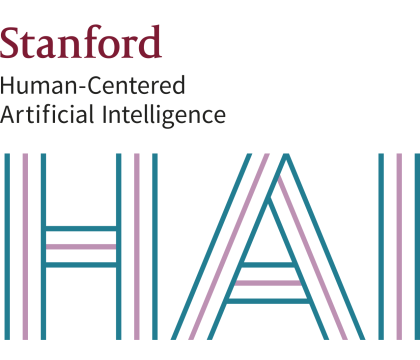Human-Centered Artificial Intelligence Seed Grants
Call for HAI Seed Grant Proposals
November 2nd, 2020 Update: All decisions have been distributed through email to the main PI on the project. Feel free to reach out to hai-grants@lists.stanford.edu with any questions.
Note: because of disruptions applicants may be facing due to fires in the Bay Area, the proposal due date has been extended from August 19, 2020 to August 21, 2020.
The goal of the Institute for Human-Centered Artificial Intelligence research program is to foster interdisciplinary AI research that aims to improve the human condition. Along these lines, we seek proposals for up to $75K that support new, ambitious, and speculative ideas with the objective of getting initial results. We especially aim to fund proposals that can make a persuasive case that these initial results will catalyze further support from internal and external stakeholders. We expect to award up to 30 grants.
In keeping with the multidisciplinary mission of HAI, we welcome proposals from the whole array of humanistic, social scientific, natural scientific, biomedical, and engineering approaches, including critical, historical, ethnographic, clinical, experimental, and inventive work. We expect to fund a wide variety of projects, from discrete studies to book-length research to speaker series to system building and evaluation. Proposals that involve the application of standard AI methods to existing data sets or problems are unlikely to be successful. Finally, we encourage interdisciplinary proposals from across the university that involve collaborations of faculty and students whose work bridges two or more departments and/or schools.
Priority Areas
In addition to the above criteria, preference will be given to high-impact projects that align with the three broad HAI research areas:
-
Intelligence — research that aims to develop novel technologies inspired by the depth and versatility of human intelligence. Potential topics may include AI inspired by neuroscience, cognitive science, and psychology; novel unsupervised, semi-supervised, self-supervised, and supervised methods for diverse data types; knowledge and semantics.
-
Augment Human Capabilities — research that aims to design and create AI technologies that augment humans rather than replace them. Potential topics may include AI and human-computer interaction; health, medicine, and wellness; robotics and automation; sustainability and climate change; education, law.
-
Human Impact — research that aims to understand and guide the global societal impact of AI technologies for the greater good. Potential topics may include the impact of AI on economics, society, government, ethics, philosophy, policy, and other related areas of the social sciences and humanities. This may include race, ethnicity, and gender studies; interpretable, trustworthy, and fair AI; the intellectual and conceptual foundations of AI, its history, and its cultural impact. We especially encourage research projects directly related to diversity, equity, and inclusion.
Submission Guidelines
Proposals are due on August 21, 2020 at 11:59pm PST. (Note, because of disruptions applicants may be facing due to fires in the Bay Area, the proposal due date has been extended from August 19, 2020 to August 21, 2020.) Proposals will go through a review committee and ethics review board. Award recipients will be notified by late September. Please submit using the Apply button on this webpage.
The main elements of the application are:
-
Proposal: (no longer than 2 pages excluding references, PDF, single-spaced, 11 point, 1 inch margins)
-
Problem statement
-
Core research idea
-
Detailed technical (or general) problem solving approach
-
Team involved (faculty, postdocs, staff, and/or students as appropriate)
-
Informal sketch budget (e.g., “25% RA 2qtrs: $18K; fieldwork travel $3K, equipment: $4K”)
-
References (no max or min limits, not counted towards 2 page limit, at the end of the PDF file)
-
-
Ethics Review Board (ERB) statement: (one page PDF, single-spaced, 11 point, 1 inch margins). The ERB panel may ask for more detail in response. Read more details about the ERB statement and process.
-
Detail the ethical challenges and possible negative societal impacts of the proposed research. What are the possible long-term consequences of this research?
-
Articulate general principles that you will use to eliminate or mitigate these issues. Then, translate those principles into the specific design decisions you are making in your proposed research.
-
Eligibility
We welcome proposals that come from students, staff, and Stanford faculty. Each proposal must have a Stanford faculty or researcher who qualifies as a Principal Investigator (PI) according to Stanford University Policy.
Funding Amount and Usage
Proposals may request up to $75,000 for 12 months. Award amounts will be based on an analysis of a budget request. No indirect costs will be charged but an 8% infrastructure charge will be imposed.
Funds may be used for salary and tuition support of faculty, graduate students, and other research staff, operating supplies, minor equipment items, prototyping expenses, imaging time, and travel directly associated with the research activity. Funds will not support general staff or administrative support.
Selection Criteria
HAI will review proposals based on:
-
Intellectual merit of the proposal, with quality, innovation, interdisciplinary collaboration, and creativity balanced by the project’s likelihood of success.
-
Alignment with the Priority Areas listed above.
-
Recommendations from the ethics review board.
Deliverables and Reporting Requirements
Awardees must be willing to attend and present the results of their work at future HAI events or seminars as well as volunteer to review for future HAI seed grant programs. Appropriate projects may also be requested to present at other venues, such as SAIL Faculty Lunches, GSB seminars, Ethics in Society events, etc.
Timely and substantive reporting of the value derived from seed grants is important to HAI’s ability to continue and expand our grant programs. Six months after receipt of funds, recipients must provide a 1-2 paragraph summary of research status and results, fund usage, and next steps. One year after receipt of funds, recipients must provide a final report of research results, fund usage, and a list of publications, articles, or conference talks emerging from the research.
Contact
General questions? E-mail us at hai-grants@lists.stanford.edu
Questions about the ethics review board statement? E-mail us at ethicsreviewboard@lists.stanford.edu
